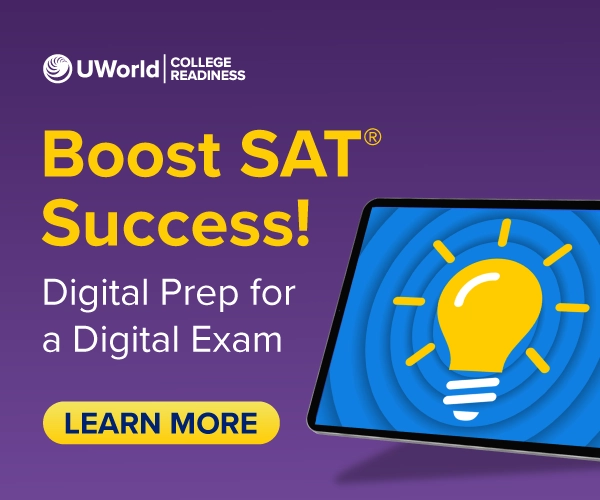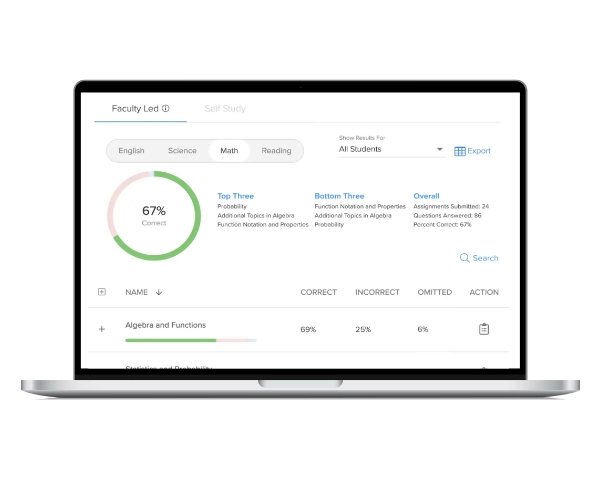In the high-stakes world of standardized testing, students thrive when the support they receive extends beyond the classroom and into the home. Dedicated teachers like you know that test prep for the SAT®, ACT®, and AP® exams is a team effort. When parents are equipped to reinforce learning, students gain confidence, develop stronger study habits, and show up on test day believing in themselves.
So, how can you foster meaningful parental involvement in your students’ education? It starts with communication, collaboration, and a shared commitment to student growth.
Parents and Student Test Prep
A growing body of research confirms what you’ve known all along: The importance of parental involvement in education is undeniable. When families are engaged, students are more likely to complete homework, develop positive attitudes toward learning, and perform better on assessments.1
Test prep amplifies this need. Whether students are preparing for the SAT, ACT, or AP exams, success hinges on consistent practice, emotional support, and effective time management — factors that are difficult to cultivate during school hours alone. That’s where parents come in.
Despite their best intentions, many parents feel unsure how to help. They may face barriers such as:
- Work schedules that prevent structured at-home support
- Unfamiliarity with the content tested on the exams
- Anxiety about applying pressure or saying the “wrong” thing
You can help bridge these gaps through proactive communication and simple, supportive resources that invite parents to participate confidently and constructively in their child’s test prep efforts.
Your Role in Test Prep
Parents can’t effectively support their kids if they lack the proper knowledge. By providing details about upcoming college-level exams, you’re empowering parents to take a more active, informed role in their child’s education. Whether sharing key dates or explaining what test day will look like, your outreach can transform confusion into clarity.
Provide Clear Test Information
Start by demystifying the testing process. When parents understand exam timelines, scoring structures, and what’s at stake, they can better guide their kids. Consider emailing parents or sending via your learning management system (LMS) a 1-pager with:
- Test dates and registration deadlines
- Overview of the exam format (sections, timing, scoring)
- What to bring (and what not to bring) on test day
- Contact information for questions
While parents already have access to much of this information, it’s often overlooked or disregarded. By emphasizing the importance of these exam details, you can eliminate guesswork, offer transparency, and foster trust.
Host Information Sessions
Between lesson planning, meetings, and grading, your schedule is already packed — and even finding time for breaks can be challenging. Still, a brief 20-minute evening webinar can make a lasting difference for families. Consider hosting bite-sized sessions that walk parents through:
- Test-taking strategies and pacing tips
- How to set up a study-friendly environment
- Simple ways to reduce test anxiety
Hosting sessions like these is a thoughtful way to keep parents informed and strengthen the parent-teacher bond. It also offers space to normalize the emotional ups and downs of test prep and reassure parents that they’re not alone.
Of course, after-hours webinars may not be feasible for every teacher. That’s why we’ll explore these topics in more detail below, and you can share the same information asynchronously through your LMS in a recorded video or message.
Encourage a Positive Learning Environment at Home
As the adage goes, knowledge is power. When you help students and their families stay informed about crucial exams, you share that power. But true empowerment goes beyond knowledge sharing. It’s about urging parents to actively and enthusiastically engage in their child's educational journey at home.
Begin With Essential Nutrition
Preparing for the ACT, SAT, or AP exams is akin to preparing for a marathon. It’s all about supplying the body with what it needs to keep going. In terms of test-taking, students are running a mental marathon, and they’ll need all the energy they can get. You can help parents by stressing the importance of:
- Serving high-protein meals the night before the exam (and in general) to help support students’ overall brain function2
- Including low-sugar snacks for their student to enjoy during an exam break (protein bars, trail mix, bananas, or apple slices)
- Eliminating caffeine from their child’s daily routine to avoid mid-exam jitters and crashes
You can also encourage parents to help students test their snack strategy during practice exams. A light boost is all that’s needed, not a full meal or sugar bomb. When properly energized, students will feel better and score higher — precisely what everyone wants to see.
Create a Study Routine
Reasonable study structuring will always do more good than harm. Encourage parents to:
- Set sleep schedules at least 1 week before the test (9-10 hours per night is ideal for their child).
- Designate a study space that’s quiet and distraction-free.
- Rotate study locations to build flexibility and mimic an unpredictable testing environment (e.g., kitchen table, backyard, or living room).
- Use timers to mirror real test conditions.
The goal? To provide an exam-like environment that still preserves the supportive and inviting atmosphere of home. Nobody can do that better than kind, sympathetic parents aiming to champion their children.
Become the Study Buddy Students Need Most
Parents don’t need to master the content, but they can help their kids stay grounded and resilient through the mental marathon. Students won’t learn everything before test day — and that’s OK. What matters more is whether they can manage their mindset, keep moving forward, and work with what they know. You can invite parents to:
- Remind students they’re not expected to be perfect, just prepared.
- Reframe tough moments with questions like, “How might you tackle this differently?”
- Have their child flag challenging questions and return to them later rather than getting stuck.
With the shift toward digital and hybrid testing models, parents may also want to consider a mix of digital and physical prep tools. Practicing with a screen helps simulate exam conditions, while handwritten notes or print study guides can support focus and memory.
Finally, help parents keep engagement alive by connecting test content to their child’s real-world interests. Whether using podcasts, documentaries, or topic-based playlists, making the material feel relevant can spark motivation — especially when energy dips or doubts creep in.
Promote Positive Reinforcement
Everyone needs a little reassurance from time to time — especially young learners bracing themselves for the rigors of higher education. With this in mind, remind parents that they don’t need to reteach algebra or grade essays. Instead, it’s to encourage, uplift, and listen. You can emphasize:
- Celebrating effort and growth, not just scores
- Using affirming language (“You’ve worked hard for this!”)
- Acknowledging stress without escalating it
Knowing the material is one thing, but recalling it under pressure is the real test. Encouragement can make a significant difference alongside test-anxiety management.
Manage Stress and Test Anxiety
Racing heartbeats and sweaty palms are more familiar to some students than whiteboards and #2 pencils. That’s why it’s essential to prioritize strategies to ease stress and test anxiety in the classroom and at home. Encourage parents to help their teens stay grounded by:
- Practicing breathing techniques or short mindfulness routines3
- Skipping last-minute cramming in favor of steady review
- Staying calm, modeling confidence, and being a reassuring presence
Above all, students should (repeatedly) hear that no single test defines their worth or potential — even though it feels that way in the moment.
Importance of Strong Parent-Teacher Partnerships
The benefits of solid home-school partnerships are hard to ignore. From academic growth to personal confidence and future readiness, strengthening your relationship with parents and guardians helps create lasting impacts for students preparing for high-stakes exams.
Improves Academic Outcomes
Students with active parental support tend to earn higher test scores, complete homework more consistently, and demonstrate improved classroom engagement.4
Boosts Student Confidence
When teachers and parents believe in a child’s ability, it becomes contagious. And that belief is the most important item students carry into the testing center.
Develops Lifelong Skills
Test prep isn’t just about test day. The discipline, time management, and emotional resilience students gain will serve them in college and beyond.
Success Starts at Home
When you take small steps to guide parents in helping their child prepare for important tests, the ripple effects can be profound. By demystifying test prep, sharing practical resources, and fostering emotional support, you empower parents or guardians to become true partners in their students’ success.

References
- Ahn, S., & Kim, D. (2024). The effects of test anxiety on academic performance: Evidence from a large-scale natural experiment. Applied Economics, 56(15), 1647–1660. https://doi.org/10.1080/00036846.2024.2314569
- Bouzid, A., Gharbi, I., Kooli, W., Souissi, A., & Aouicha, M. B. (2024). The effects of stress and anxiety on academic performance: A systematic review. Cureus, 16(4), e11067507. https://www.ncbi.nlm.nih.gov/pmc/articles/PMC11067507
- LSU Health New Orleans. (n.d.). Strategies to reduce test anxiety. School of Nursing, Academic Success Program. Retrieved May 22, 2025, from https://nursing.lsuhsc.edu/academicsuccessprogram/strategiestestanxiety.aspx
- White, R. D. (2024). School–family partnerships and academic resilience: A longitudinal study. Educational Administration Quarterly. Advance online publication. https://doi.org/10.1177/00131245251314489






